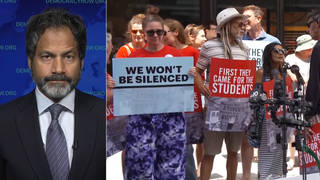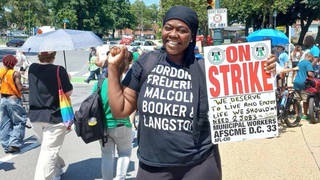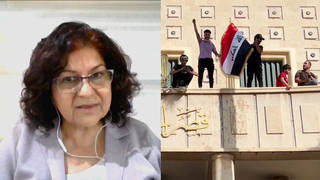
Guests
- Carlos Arredondohis son, 20-year-old Marine Lance Cpl. Alexander S. Arredondo, was killed in Najaf on Aug. 25, 2004.
As the fourth anniversary of the U.S. invasion of Iraq approaches, a coalition of antiwar groups has created the Endless War Memorial in New York City. Hundreds have gathered in Times Square for a six-day reading thousands of names of the war dead in Iraq, including U.S. soldiers, Iraqis and journalists. We speak with Carlos Arredondo, his son, Alexander, was killed in Najaf in August 2004. [includes rush transcript]
Transcript
AMY GOODMAN: Next week marks the fourth anniversary of the U.S. invasion of Iraq. During those four years, nearly 3,200 American soldiers have died, many thousands more have been wounded. As many as 650,000 Iraqis have been killed with the number of wounded unknown.
As this fourth anniversary approaches, a coalition of antiwar groups has created the Endless War Memorial in Times Square here in New York. Hundreds of people have come together for a six-day reading of thousands of names of the war dead in Iraq, including Americans, so-called coalition soldiers, Iraqis and journalists.
CARLOS ARREDONDO: Christopher Zimny, 27 years old, Marine corporal, January 31, 2005.
READER: Abdul-Hussein Khazal, correspondent of the U.S.-funded television station Alhurra, 2-9-2005.
READER: Shaker Jassem Ajeel, also known as Abu Furat, an adult political party member killed in Baghdad January 22, 2004.
CARLOS ARREDONDO: Edward E. Jack, 51 years old, Navy lieutenant commander, January 29, 2005.
READER: Yasser Aboud, also known as Abu Jamal, an adult political party member, killed in the district of al-Jadida Mashtal, Baghdad, January 22, 2004.
CARLOS ARREDONDO: Keith Edward Taylor, 47 years old, Navy lieutenant commander, January 29, 2005.
AMY GOODMAN: That was Carlos Arredondo. His son Alex was killed in Najaf August 25, 2004. Carlos has traveled across the country with an empty coffin and a picture of his son’s open casket and funeral. He was in Times Square yesterday afternoon. He joins us in the studio right now. We welcome you to Democracy Now!
CARLOS ARREDONDO: Good morning.
AMY GOODMAN: Carlos, why did you come to Times Square?
CARLOS ARREDONDO: We’re getting ready for the march in Washington, and we got prepared in Times Square to read all these fallen heroes, including my son’s name, Iraqi citizens, people from the NATO forces, people who die from the media. So we’ve been up there trying to share these feelings, this mourning that we have, public.
AMY GOODMAN: Talk about your son Alex, how you learned that he died on August 25, 2004. It was your 44th birthday that day?
CARLOS ARREDONDO: That’s correct. That day was my 44th birthday. When I first saw the marines pull up in front of my house, I thought it was a surprise for my birthday. Instead, it was —
AMY GOODMAN: That Alex was coming home?
CARLOS ARREDONDO: Yes. Instead, what happened is they was coming to inform me the death of my son, and that day my whole world turned upside-down. And by dinner, I learned 974 servicemen had been dying already, and it’s been a very difficult times at the moment in dealing with the whole situation, seeing how the administration has been conducting the war in Iraq and feeling for the pain, not only for the American families, but also what the families in Iraq was going through. And when that 974 —- knock on my door that day, the worst nightmare I ever have. I just keep asking the group of young marines who dropped by my house to leave my house, because I was hoping that nightmare would go away, and perhaps they was in the wrong house, they got the wrong name. Unfortunately, this denial, many Gold Star Families, we go through when they come to inform us. And the way that things escalate by the people who were there, don’t leave when I was asking to leave for more than half hour, three different times, and was a point where I came out with a hammer and gasoline and a gas propane torch, and -—
AMY GOODMAN: A gas propane torch?
CARLOS ARREDONDO: And I pretty much I destroyed the U.S. government van, who was there, knowing that my son one time took that van away and never returned.
AMY GOODMAN: Now, the marines were outside of the van, but you went to the van, and you started to hammer away and to pour gasoline on it?
CARLOS ARREDONDO: The marines was parked in front of my house. They standing right there the whole time. They never bothered to bring inside the house or bring any support or [inaudible]. And I keep asking for three different times to leave my house, and I just took it the way I took it.
AMY GOODMAN: Your mother was there. She had just baked a birthday cake for you?
CARLOS ARREDONDO: My mother was there, and that day she was already preparing the celebration for my birthday, and she was the only one pretty much who was trying to rescue me, to do something about it, because I saw the marines pretty much making phone calls after I was acting, and that’s the way pretty much I deal with the situation at the moment. This was one of the biggest — one of the many mistakes this war has been conducted in many situations all along.
AMY GOODMAN: And so, what happened after you poured the gas in the van?
CARLOS ARREDONDO: I went inside the U.S. government van, and then I started destroying everything inside and screaming and yelling for my son, and pretty much knowing that this really was happening, and then I start pouring gasoline all over the van. And then it was really hard to breathe, and then I opened the gas can, the propane gas, and —
AMY GOODMAN: Your mother had come then?
CARLOS ARREDONDO: My mother was in the side door of the van, and she was at the moment screaming and yelling for help, and nobody was around there to help her, and she tried to reach my hand to pull me out. That’s when I pretty much pressed the button for the flames to come out, and the explosion occurred, threw me out of the van on fire, landing on the ground. And then I wake up in the hospital later on with 36 percent of my body burned, second- and third-degree.
AMY GOODMAN: Your wife had pulled up at that point, had driven home —
CARLOS ARREDONDO: My wife pulled up at that point, a couple of minutes right after the explosion, and pretty much she ran to help me and to see if I was OK and came to my aid.
AMY GOODMAN: Where was your other son, Brian, 16?
CARLOS ARREDONDO: At the time, Brian was in Bangor, Maine, where his mother live, my ex-wife. One van pulled over in Bangor, Maine, at the moment, and one van pulled over in Hollywood, Florida, at the same time. So it was two different notification things at the moment.
AMY GOODMAN: So one was informing your wife and your son, and one van had come to inform you?
CARLOS ARREDONDO: And the one in Bangor, Maine, they brought a chaplain. They brought three marines, and they pretty much walk into the living room to talk to my ex-wife. And my case was totally different. My case was only three marines. They never brought a chaplain. They never brought me inside the living room. I didn’t have any support. I only just have anger for what I already live through what I learned through the media about this war, how it was being conducted in Iraq.
AMY GOODMAN: And so, after being burned on about a quarter of your body, what did you do? Were you able to make it to your son’s funeral?
CARLOS ARREDONDO: I was transported from Florida all the way to Massachusetts for my son’s burial, thank God. We had an open casket — thank God for that, too. Thank God, because not too many families are as lucky as we are, you know. And even that is for granted, because not everybody is lucky to get an open casket in the way the soldiers die today. I was transported in a bed. Thank God that I was there, which was very important for me to be there. And as soon as I get out from the hospital, I was already talking to media, sharing my grief and letting know what really happened here.
AMY GOODMAN: And so, soon after, you began this odyssey, rolling a coffin across the country, an empty coffin. Why are you doing that?
CARLOS ARREDONDO: Well, this is my pain. This is my loss, my son, honored to protect us. I’m protecting my son’s honor. As you know what happened in Walter Reed recently in Building 18, myself and many people are not too happy about the way they’re treating their soldiers who come back from the battlefield right now. But the way I start doing that is for my own personal healing process, making this very public, since the government don’t want we to see caskets during the funerals. And it’s a way for me to share this grieving with the public, because many people live in their own bubbles, and they don’t care really about what’s going on outside their own bubbles, and I want them to feel what they see, what really happens every day, not only in this country, but this happens all over the country. We have NATO forces from El Salvador, Spain, England, Australia, and it’s a high number of casualties from these countries also.
AMY GOODMAN: We’re talking to Carlos Arredondo, who lost his son. He was 20 years old and 20 days, August 25, 2004, in Najaf. He was a Marine lance corporal, Alexander S. Arredondo. You have since become an American citizen. You were born in Costa Rica?
CARLOS ARREDONDO: That’s right. That’s correct. On December 12, I receive my citizenship that day. Also that day, when I wake up, I learn about three other U.S. servicemen who died, and this is nonstop every day happen. I was very grateful that I received my citizenship, because with the way I’ve been doing my mourning, very public, so I was very worried about the corpus law that passed against any people who do any act against the government, or perhaps if me picked up for any other reason. And thank God I had the opportunity now. Even then I was pretty much practicing the First Amendment of the Constitution. And I’m still now holding my passport up and sharing these thoughts with many, many people around the country.
AMY GOODMAN: Others got their citizenship that day with you who had fought in Iraq?
CARLOS ARREDONDO: Oh, yeah. We have there almost 1,000 people receiving their citizenship. And also that day we have there three U.S. soldiers, who went — who had already been in Iraq fighting, and they was there because they served the country, and that’s the way, they were saying — that’s the way for them to get the citizenship.
AMY GOODMAN: Carlos, you changed your name on that day?
CARLOS ARREDONDO: Yes, I also changed my name. I changed my name after my sons. My name now is Alexander Brian Arredondo. I had the opportunity, and I take it to honor my sons. It’s a grateful opportunity.
AMY GOODMAN: So, Alexander, for your older son who died, and Brian, for your younger son who’s now 19?
CARLOS ARREDONDO: Correct, yes.
AMY GOODMAN: So, I’ve been looking through this notebook that you have of the letters your younger son, Brian, has been receiving from the Army National Guard, as they try to recruit him, and there’s some remarkable ones. This latest one that you showed me in Times Square last night says, “This is not a credit card. This is money in the bank.” And this is a fake credit card that is on this piece of paper that has his name, Brian Lewis Arredondo, and it says, “This card could entitle you to over $60,000 in cash and other benefits as a qualified member of the National Guard. As a member of the National Guard, you may also qualify for college first enlistment option, up to $20,000 enlistment bonus, up to $10,368 for books and fees, as much as $12,600 to cover additional college costs, and $4,500 in tuition assistance benefits.”
CARLOS ARREDONDO: Yeah, that’s just — I’m outraged about that. You know, I already lost my other son, and they’re still trying to seduce my other son Brian with all this money and these promises. And as you see this happen all over the country right now in the malls, in the hallways of the high schools, and that’s a way how they seduce our sons and daughters, and we need to do something about that, because they’re getting out of hand. Now, not even the immigrants are safe, because they’re offering them their citizenship to serve the country.
AMY GOODMAN: I’m looking at another letter. That one was signed by Colonel Michael Jones, Chief Strength Maintenance Division, National Guard Bureau, Arlington, Virginia. This is Richard Guzzetta, colonel, National Guard Bureau. And in this letter, this recruiting letter, it says, “You could be eligible for an enlistment bonus of up to $20,000 for joining the Army National Guard. What can you do with $20,000? A new car? Pay off credit cards? Help your family? It’s up to you. It will be your money, money you earn by making a commitment to serve your country. Remember, the decisions you’re making right now will have a huge impact on how the rest of your life turns out.”
CARLOS ARREDONDO: Our sons and daughters have a very hard time just being out there trying to deal with all these corporations who are selling all this stuff to them. On top of that, the recruiters come to the high school, and they’re seducing our sons with all these promises, and we have all these corporations behind the administration Bush, who really need to sell their own weapons. They need to sell whatever they need to sell, and they pretty much get all these programs together somehow to our community, and I think it’s enough is enough. Que falla! Basta ya! Suficiente!
AMY GOODMAN: I was watching the police interact with you. You not only brought the coffin to Times Square right in front of the Army recruiting station, where they have a very big illuminated Army video that goes around the clock, and the police on horseback were there. There were police standing in the street, but they were very solicitous of you. You also had a car nearby that is covered with pictures of your son, of Alex, a letter he wrote that’s blown up that you have for people to read. You call it Camp Alex. You’ve got his Army boots there. How have the police treated you? What’s their response to you?
CARLOS ARREDONDO: Well, the police right here in Times Square, New York, they know better than any other police station in the United States forces. They are really still mourning 9/11. And they are very helpful. They are very — they are good, therefore. I can say a lot of good things about how good they’ve been treating us and support us, and thanks to the department of police of New York for helping us.
AMY GOODMAN: And why do you think they have treated you in this way?
CARLOS ARREDONDO: Well, because, like I say, you know, some of them already been in the National Guard. They already have a high number of casualties themselves from New York. And like I said, they know better. They know better. They feel it. They don’t need to see a war. You look at their faces, and they pretty much are telling me what their position are on the war.
AMY GOODMAN: As you drag this coffin, rolling it across the street, you stop people, just passersby, people who have nothing to do with you, dead in their tracks, when they see this coffin. I met you on Labor Day weekend in Provincetown, Cape Cod. It was the big holiday weekend. You’re coming down Main Street with a pickup truck with this coffin in the back, and people stop. Where else have you gone around the country, and where are you headed now?
CARLOS ARREDONDO: We’ve been from the East Coast all the way to the San Diego border, to all the way to Olympia, Seattle, Washington state, to Texas, all the way to Idaho and across the country.
AMY GOODMAN: And today you’re headed?
CARLOS ARREDONDO: And the next stop will be Washington, D.C., for the march —
AMY GOODMAN: Philadelphia tomorrow?
CARLOS ARREDONDO: — this Saturday. First, I went to Philadelphia, and then I’m going to be going to Washington, D.C., for the march, and welcome everyone. And also there’s going to be a march here in New York City on Saturday the 18th. Everybody’s welcome. Please participate. It’s our duty and responsibility. And also, after that I’m going to be going for a whole month with a hip-hop tour across country, which we’re going to be going to many different cities.
AMY GOODMAN: And on Saturday, you’ll be with the march on the Pentagon.
CARLOS ARREDONDO: We’re going to be with the organization ANSWER, and participate with many other organizations, who we’re going to be pretty much put in practice the First Amendment of the Constitution, and also trying to let them know that we’re here and we’re going nowhere.
AMY GOODMAN: Have you talked to members of Congress?
CARLOS ARREDONDO: Yes. I’ve been meeting with members of Congress at different times and let them know that we need to do a change, and we are here to help them, just let them know all what’s our position on this, because they know what is our position on this, but we have to remind them that we are here, and we are here to work with them.
AMY GOODMAN: Carlos Arredondo, I want to thank you for being with us, a Gold Star father. He lost his son, Marine Lance Corporal Alexander S. Arredondo, August 25, 2004. It was Carlos’s 44th birthday. Carlos now heads to Washington to march on the Pentagon on Saturday. Thanks very much for joining us.
CARLOS ARREDONDO: Thank you.













Media Options